Is Switzerland the world champion of recycling?
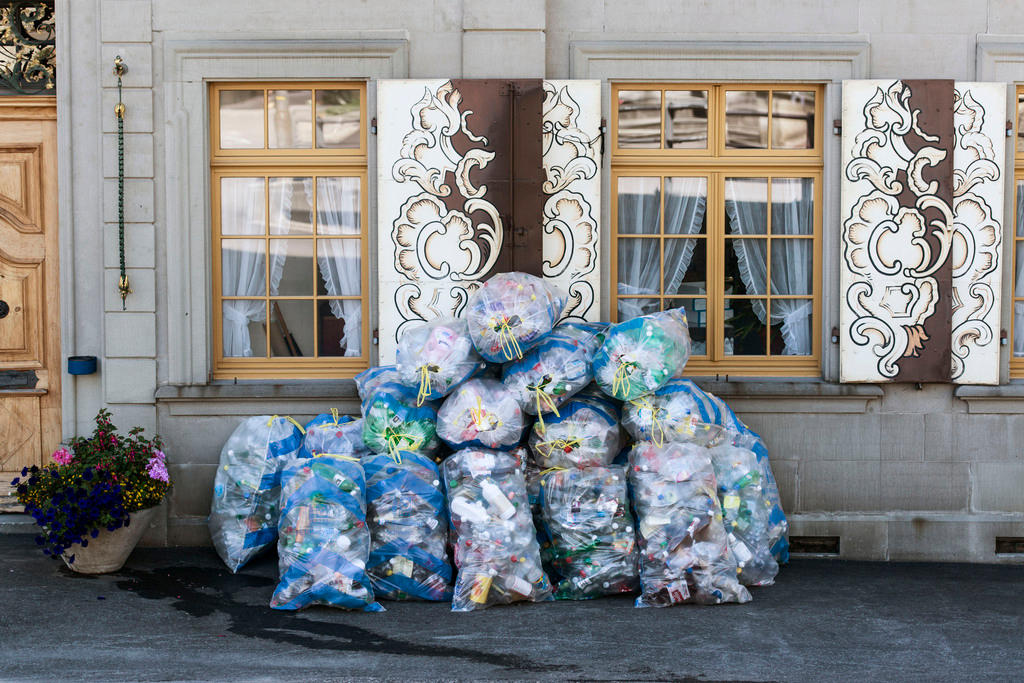
Finding international studies on recycling may be easy, but crowning a champion is not. The trouble lies with how countries calculate recycling rates.
A catchy sound bite, “Switzerland is the world champion of recycling” has been proclaimed over the years by the media, the recycling industry, and even government agencies promoting the country’s image abroad. Now opponents to a people’s initiative for a green economy, which is up for a nationwide vote on September 25, are using the claimExternal link to moot proposals to boost recycling as a means of reducing Switzerland’s carbon footprint.
Among them, economiesuisse stated in a press releaseExternal link that Switzerland, “a role model in matters of recycling, attains rates that other European countries can only dream of”. And in a subsequent policy paperExternal link laying out its arguments against the initiative, the business lobby group published an infographic, complete with impressive recycling rates, that declares the Swiss “world champions” of recycling.
In fact, finding the world’s top recycling nation is harder to do than the evidence suggests.
The data
Several countries besides Switzerland appear to have a claim on the recycling crown. In the latest report from the OECD looking at overall recycling and composting ratesExternal link for municipal waste, leader Germany (65%), a handful of other European countries and South Korea all fare better than Switzerland (51%).
These rates are similar to data for 2014External link compiled by Eurostat, the European statistical agency.
Given these figures, it’s puzzling how Switzerland could be called world champion. Patrik Geisselhardt, head of umbrella organisation Swiss RecyclingExternal link, believes the title was in fact relevant at one time.
“Thanks to the ‘polluter pays’ principle, Switzerland was one of the first countries to achieve high rates (of recycling),” Geisselhardt wrote in an email to swissinfo.ch, referring to fees for rubbish bags first introduced by several municipalities in the 1990s that encourage recycling.
“It is also a fact that in the meantime Germany, Austria and the Nordic countries have reached similar rates (to Switzerland).”
Different methods, different rates
But whether Germany or any other country should be named champion based on these rates is up for debate. The OECD cautions that definitions of municipal waste and surveying methods vary across countries. As a waste management expert at the Federal Office for the EnvironmentExternal link explained, not all countries calculate recycling rates the same way.
“For example, German households can use a plastic bag to collect all recyclable packaging waste, which is then taken to a sorting centre to be separated for recycling and for thermal energy recovery,” said Michael Hügi. Even if not all of it ends up being recycled, in this case the total amount of pre-sorted waste is used to calculate the recycling rate. In Switzerland, however, sorting is done at the source, usually by the consumer, so the calculation is based on pure waste materials that are actually suitable for recycling.
These differences, said Hügi, make it difficult to get an accurate ranking according to recycling rate – or indeed to crown a recycling champion.
To get a clearer picture of recycling in the European Union, the European Commission is proposing harmonised calculation methods using the amount of waste entering the final recycling process, once sorting has taken place. But the German Association for Waste Management (DGAW) has warned that this change could see the country’s current rate drop below 50%, the European recycling target for 2020.
Put another way, changing the calculation method could lead Germany and others to fall behind Switzerland in future international charts.
Champions of glass recycling?
If current overall recycling rates don’t show Switzerland at the top, perhaps the world champion claim has been based instead on data for recycling specific products, as an infographic used by economiesuisse seems to suggest.
Produced by Presence SwitzerlandExternal link, a unit of the Department of Foreign Affairs that promotes the country’s image abroad, the graphic declares the Swiss world champions and shows recycling rates that pass the 90% mark for glass and tin cans.
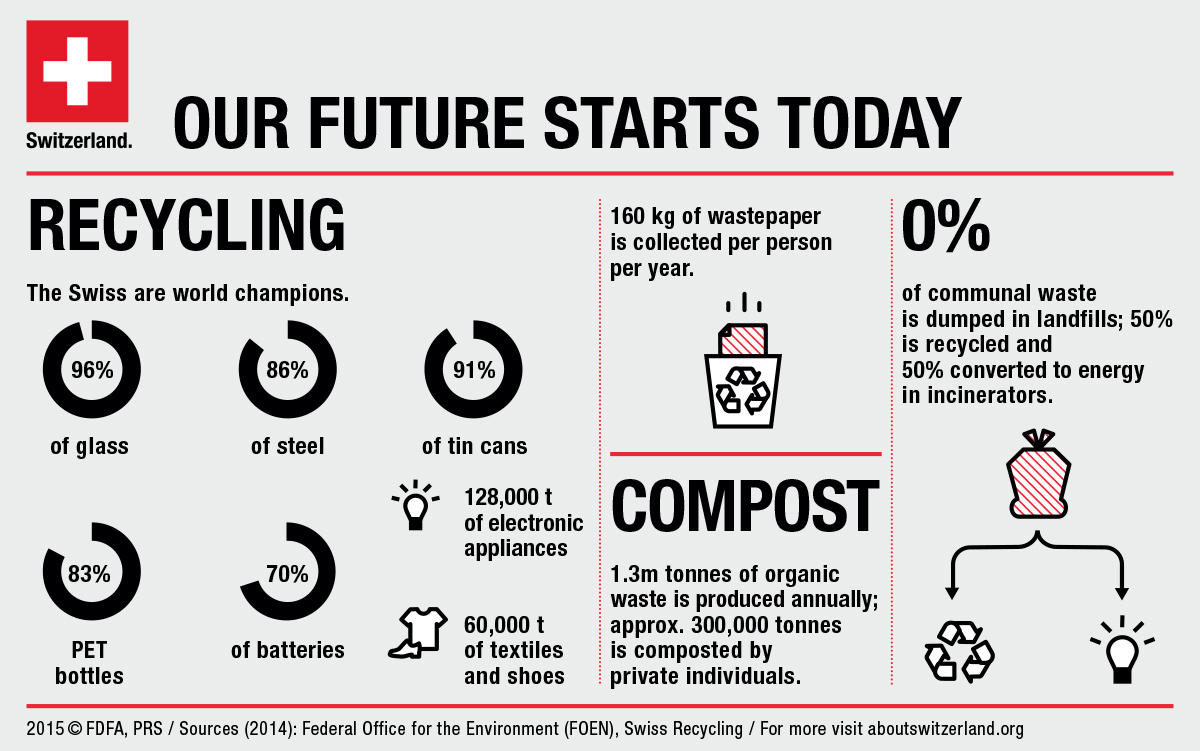
But even at an impressive 96%, figures released in 2015External link by the European Container Glass Federation show Switzerland edged out by Denmark (98%) and Sweden (97%) in recycling glass. The story is similar for recycling aluminium beverage cans: 2012 data published by the European Aluminium Association reveal a handful of countriesExternal link, such as Norway (96%), doing marginally better than Switzerland (92%).
The verdict
Comparative data on recycling, whether for specific materials like glass or for all recyclables taken together, show Switzerland finishing just a few places shy of first place – a role model, to be sure, but not top of the class. That said, these rankings may not actually be a foolproof basis for finding a so-called champion, since countries use different collection systems and recycling calculation methods.
Until these methods are harmonised, economiesuisse and others may want to put the championship talk aside, and say instead that, when it comes to recycling, Switzerland is among the best in the world. No one would dispute that.
You can find out more about our fact-checking series in this live video originally broadcast on Facebook with the author, Geraldine Wong Sak Hoi, and journalist Jo Fahy.
PLACEHOLDER
Have you heard a statement made by a public figure that you would like us to fact check? Tell us in the comments below!

In compliance with the JTI standards
More: SWI swissinfo.ch certified by the Journalism Trust Initiative









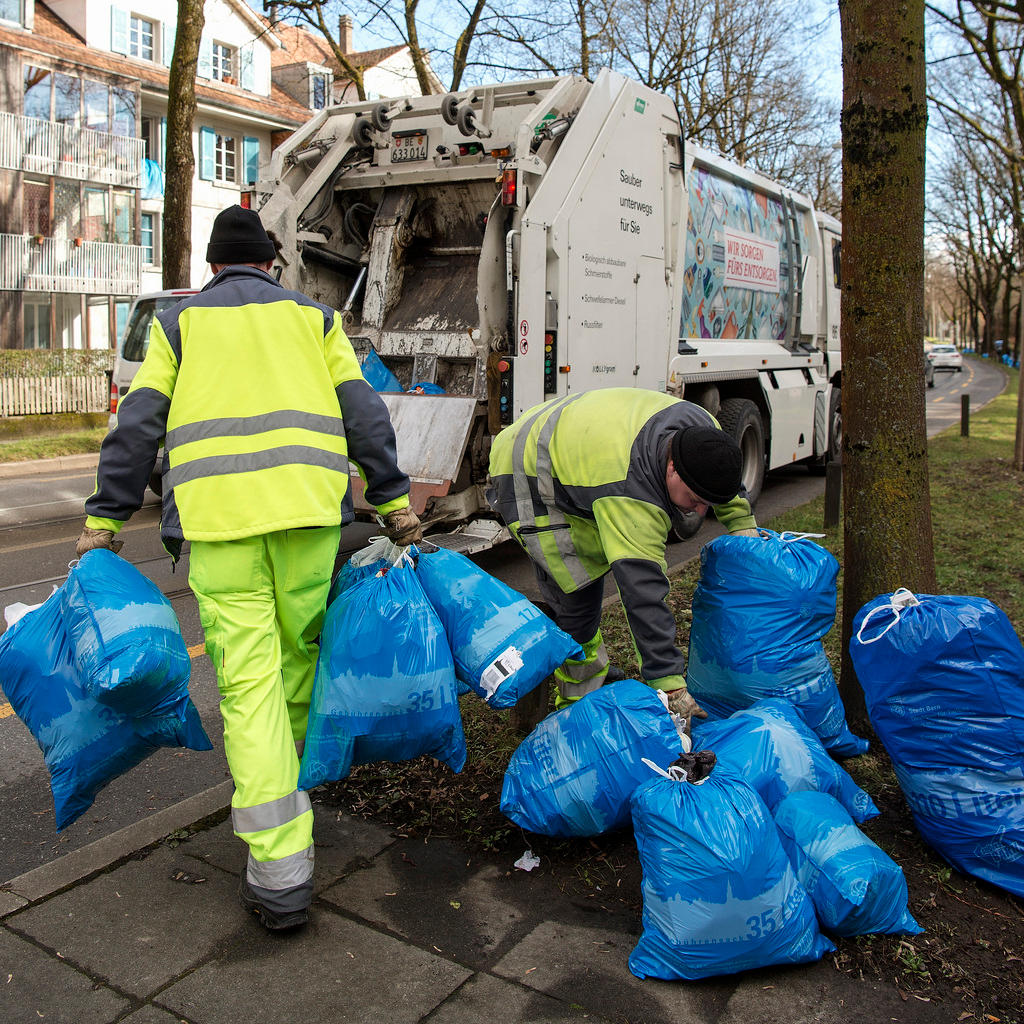
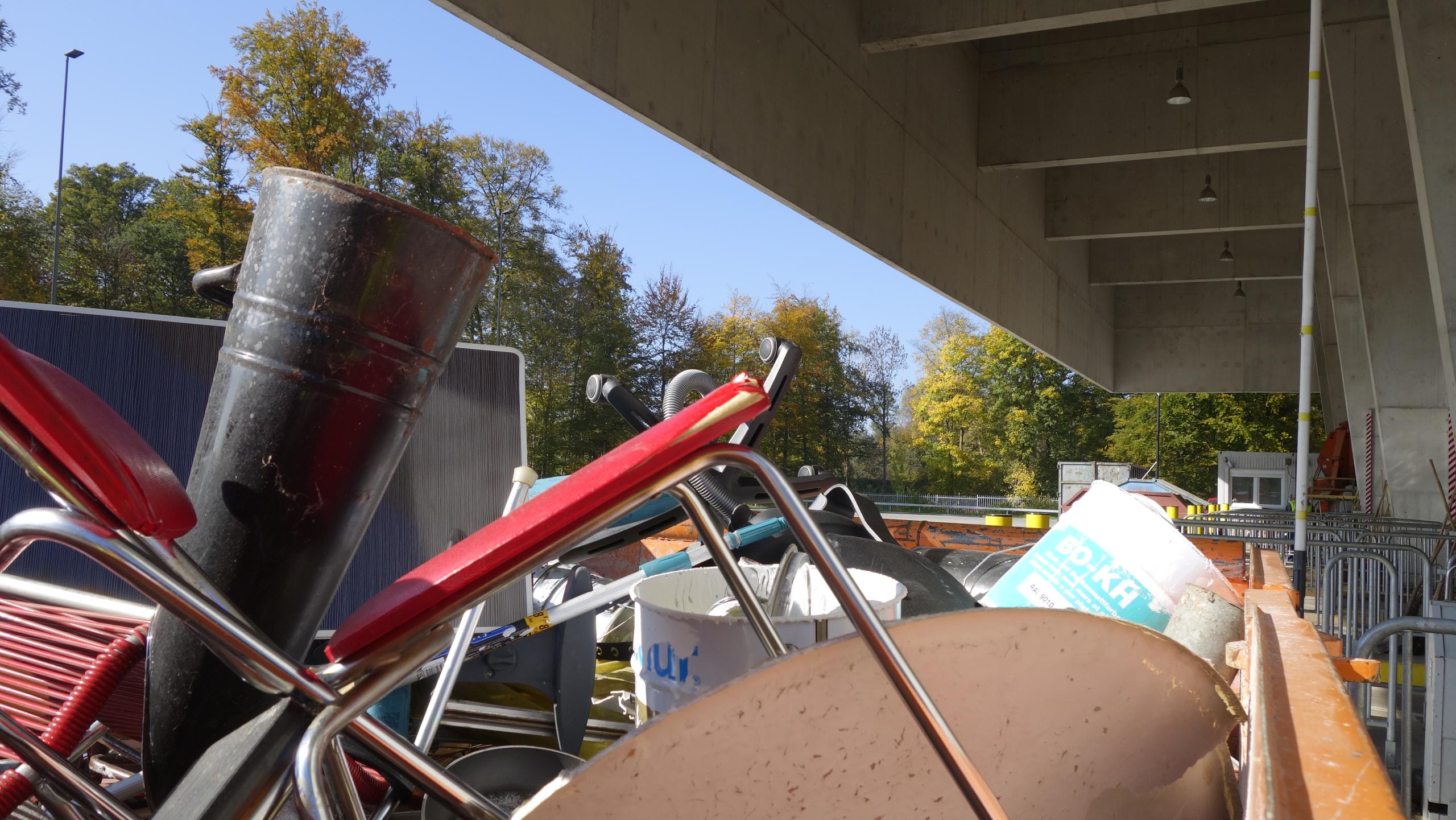
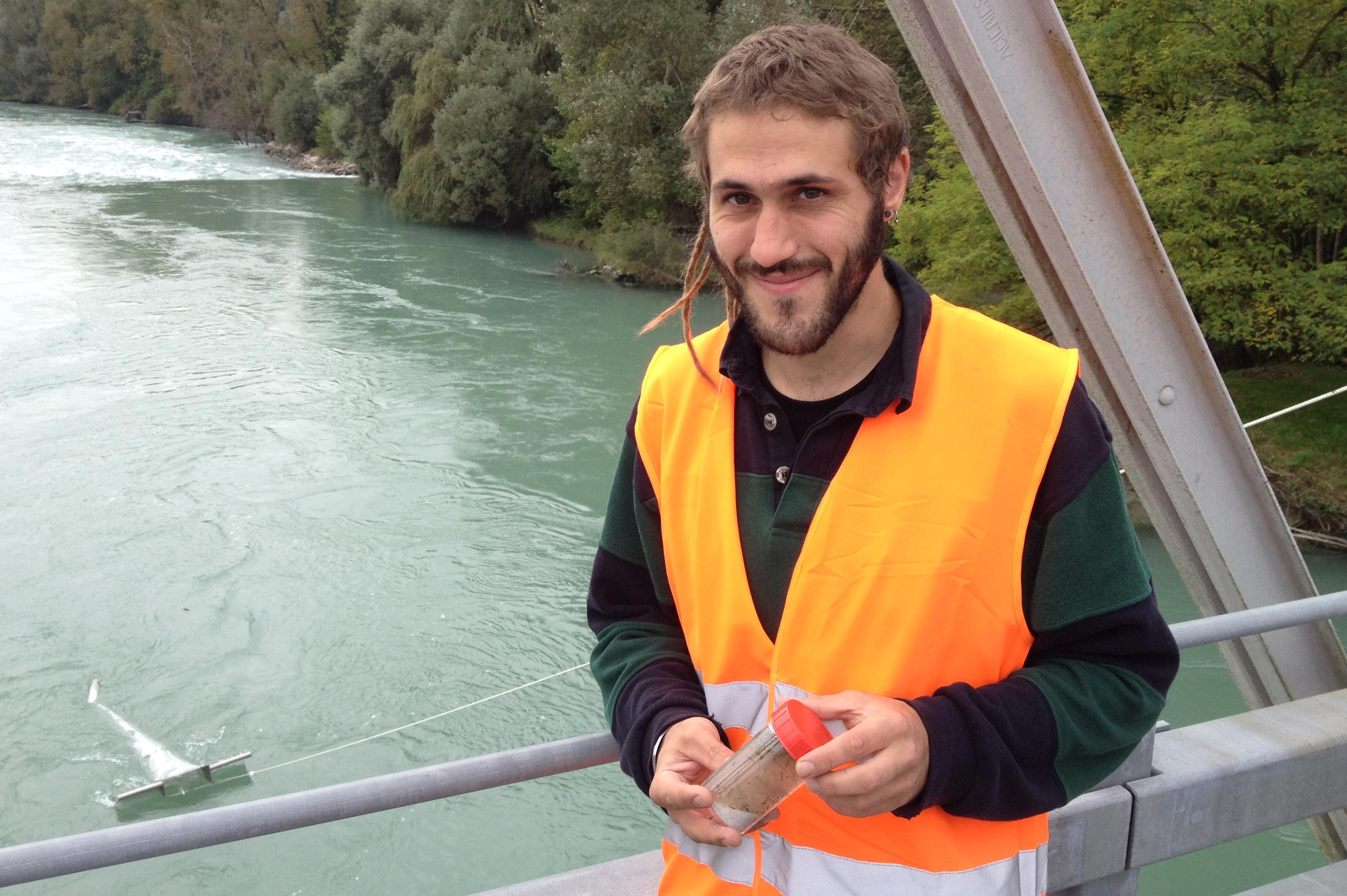
You can find an overview of ongoing debates with our journalists here . Please join us!
If you want to start a conversation about a topic raised in this article or want to report factual errors, email us at english@swissinfo.ch.